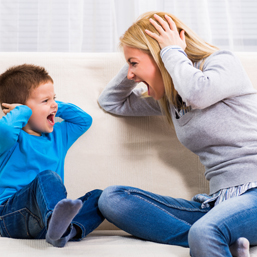
Yelling works but only if you save it for emergencies. If you yell at your kids all of the time, they get used to it and it loses its effect. It’s not surprising that we yell, though. It can feel frustrating when your kids won’t listen or when you feel like you are doing a bad job as a parent.
At Parenting Power, we believe that parents really want to be their best selves for their kids. Many of us have heard a lot of yelling when we were kids and it may be part of the parenting scripts we learned. Yelling teaches our kids that when things get out of control, people in power are loud and disrespectful. It teaches kids that it is okay for people to yell at them, but it can be different.
Here are four tips on how to stop the yelling:
1. Become aware. When and why are you yelling at your kids? Does it regularly happen around a certain situation or a certain feeling (disrespect, not knowing what else to do?). We hear from our clients all of the time (and from countless research articles) that kids’ misbehavior goes up when parents are on their smartphones. It’s called Technoference. Kids misbehave in order to get their parents’ attention. Start to notice if this is what is happening right before the yelling starts.
Once you see a pattern, Parent with a Plan™. The easiest plan is for you to park your phone during the time spent with your kids (especially those intense times: morning routine, bath time, meals, and bedtime routine). It doesn’t mean that you can’t use your device, just be intentional about when you are using it.
2. Plan language for those recurring situations - or no language. Keep your mouth closed, breathe out through your nose, and count to 10. Silent screams can also help.
3. Use the Power of “I” to express how you feel:
4. Save the teaching for when everyone is ready to talk and listen with respect. Stop the misbehavior by naming the behavior and what you need to see instead.
Talk very little and use your actions to make the change:
“I see two kids who are fighting. You each need to find your own place - I’m sitting between you.”
“I see water all over the floor. How can we make this better? Jane, please grab a towel. Sam, please move these items out of the water. We can work together to fix this.”
When things are calmer (later, another day) create a plan with your children, so they can learn a different behavior and the consequences are known. That way, in the heat of the moment, you’ll know what to say and have a planned consequence. This may leave you feeling more in control of the situation and stop the yelling.
This week, ask yourself these questions:
1. In what situations am I yelling? Is it a habit?
2. What could I say instead?
3. When can we talk as a family about this working better?
4. Is my yelling happening because the kids are misbehaving because I’m on my device? Do I really need to use my phone when the kids are in the bath?
Julie Freedman Smith and Gail Bell are the founders of Parenting Power, parentingpower.ca. Join Parenting Power for the 4th Annual #NoPhoneFamilyDay on February 17, 2020. For more information, visit nophonefamilyday.com.
Calgary’s Child Magazine © 2025 Calgary’s Child